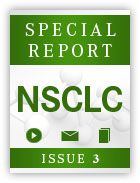Tumor Growth Reduced With Cabozantinib Plus Erlotinib in EGFR-Positive NSCLC
Eighty-five percent of patients with EGFR-positive non-small cell lung cancer (NSCLC) experienced significant reduction in tumor growth rate with the addition of cabozantinib to erlotinib.
Karen L. Reckamp, MD, associate professor and co-director of the Lung Cancer and Thoracic Oncology Program at City of Hope

Karen L. Reckamp, MD
Eighty-five percent of patients with EGFR-positive non-small cell lung cancer (NSCLC) experienced significant reduction in tumor growth rate with the addition of cabozantinib to erlotinib, according to phase II data presented at the 2014 ASCO Annual meeting.
Cabozantinib added to erlotinib showed antitumor activity in heavily pretreated patients whose disease progressed on erlotinib monotherapy, according to lead author Karen L. Reckamp, MD, MS, associate professor and co-director of the lung cancer and thoracic oncology program at City of Hope in Duarte, California.
Karen L. Reckamp, MD, on Cabozantinib Plus Erlotinib for EGFR-Mutant NSCLC
Reckamp is a professor at City of Hope.
Patients with sensitizingEGFRmutations respond well to EGFR-targeted therapy, but following clinical response, they typically experience disease progression and secondary resistance. T790M in exon 20 of theEGFRgene accounts for about 50% of acquired erlotinib resistance, explained Reckamp. T790M can be accompanied by amplification of the MET proto-oncogene, which promotes acquired EGFR tyrosine kinase inhibitor (TKI) resistance in about 20% of cases. Optimal therapy following progression on EGFR TKIs is not established.
“Cabozantinib is a multitargeted TKI and targets the [VEGF] receptor, MET, RET, AXL, c-KIT, and many others,” Reckamp said. “We’re most interested in the VEGF- and the MET-targeting aspects of the drug in combination with erlotinib in patients with EGFR TKI resistance. Those are potential mechanisms of resistance outside of T790M.”
A prior phase I/II study in which cabozantinib was combined with erlotinib in unselected patients with NSCLC demonstrated a partial response in 3 patients with prior erlotinib therapy and prolonged stable disease (>9 months) in a patient withT790Mmutation, Reckamp noted. The single-arm study she presented during the ASCO meeting included 37 patients (ECOG performance status of 0 or 1) with knownEGFRmutation and progressive disease on erlotinib immediately prior to enrollment. The median number of prior systemic therapies was 2; 14 patients had more than 2 prior systemic therapies, and the maximum number of such previous therapies was 8. Twenty-six of the 37 patients had EGFR mutation on exon 19, and 11 had EGFR mutation on exon 21.
After a median of 4 cycles of treatment and a median follow-up of 5.9 months, 2 patients had a partial response, 1 patient had an unconfirmed partial response, and 22 patients had stable disease. The disease control rate, defined as partial response and stable disease at 8 weeks and beyond, was 67.6% (25 of 37).
Twenty-two of 26 patients demonstrated significant growth-rate reduction in their tumors, corresponding to a >30% increase in the time to tumor size doubling, using each patient’s tumor growth rate during prior TKI treatment as his or her own control.
The combination of cabozantinib and erlotinib was generally well tolerated, with grade 2 diarrhea and fatigue being the most common toxicities. Diarrhea was the most common grade 3 adverse event (AE; 30%). There were four grade 4 AEs: vomiting in 1 patient, an elevated level of lipase in 2 patients, and an elevated level of serum amylase in 1 patient.
“A correlation of outcomes with MET amplification is ongoing,” said Reckamp. “We believe that the combination warrants further clinical investigation in patients with EGFR-mutationpositive NSCLC.”
The study was conducted through the California Cancer Consortium and was supported by the National Cancer Institute.
Reckamp KL, Frankel PH, Mack PC, et al. Phase II trial of XL184 (cabozantinib) plus erlotinib in patients (pts) with advanced EGFR-mutant non-small cell lung cancer (NSCLC) with progressive disease on epidermal growth factor receptor (EGFR) tyrosine kinase inhibitor (TKI) therapy: a California Cancer Consortium phase II trial (NCI 9303).J Clin Oncol

Survivorship Care Promotes Evidence-Based Approaches for Quality of Life and Beyond
March 21st 2025Frank J. Penedo, PhD, explains the challenges of survivorship care for patients with cancer and how he implements programs to support patients’ emotional, physical, and practical needs.
Read More